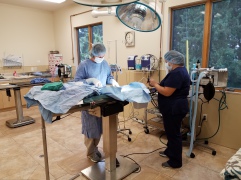Surgery and Anesthetic Monitoring
Our small animal veterinarians perform routine spay and neuter procedures. We also perform other soft tissue surgeries including tumor removal, intestinal surgeries, cystotomies, and cesarean sections. In addition, we offer on site evaluation by a board certified veterinary surgeon from Veterinary Surgical Specialists, and if surgery is deemed necessary, it can be provided on site.
Prior to any surgery your pet will be carefully examined and blood work will be recommended to screen for any underlying problems which could indicate a risk for anesthesia and surgery. All dogs will be screened for heartworm disease prior to surgery since this disease can significantly affect the ability of the heart, lungs and internal organs to process anesthesia. All cats will be screened for feline immunodeficiency virus, feline leukemia virus and heartworm disease prior to surgery.
In order to help keep your pet comfortable, pain medications will be given prior to surgery. This will also mildly sedate them to reduce their anxiety. For many surgeries, additional pain relief will be provided by performing local anesthetic blocks. Before surgery is performed an intravenous catheter will be placed and the animal will be intubated with an endotracheal tube to allow us to provide inhalant anesthesia and oxygen. During surgery a certified veterinary technician will monitor your pet’s vital signs. During anesthesia and surgery we monitor our patient’s oxygen saturation, heart rate, ECG, blood pressure, temperature, and respiration. All patients receive intravenous fluids to help maintain optimal blood pressure. After the surgery is completed your pet will be monitored until awake and given pain medication again later in the day to ensure continued comfort.
Spays and Neuters
For routine spay and neuter surgeries of dogs and cats we recommend that the surgery be done by the time the animal is 6 months old, or, in larger breeds, around 1 year of age. These procedures can be done as early as 8-10 weeks of age but for most animals we recommend completing their vaccine series first. Ideally, females should be spayed prior to the first heat cycle (as early as 6 months in small breed dogs) since this can virtually eliminate mammary cancer later in life. Female cats can also become pregnant before their first birthday so it is very important to have them spayed early. If male dogs are neutered prior to becoming sexually mature (can happen as early as 6-7 months old) you can eliminate some behavioral problems such as urine marking in the house and some forms of aggression. Male cats that are not neutered prior to becoming sexually mature (7-8 months) are at higher risk for urine spraying/marking.
Where to Find Us:
Pierce Vet Clinic
707 N Brown St
PO box 657
Ellsworth, WI 54011
Phone: (715)-273-4632
Fax: (715)-273-7970
Email:
piercevetclinic@yahoo.com
Follow us on Facebook!
Regular Business Hours
Monday-Friday
8:00 AM to 5:00 PM
Saturday
8:00 AM to 1:00 PM
Your pet's own online profile!
Apply for your Care Credit Account today!









